Pears are a deliciously sweet fruit with a tasty and specific grainy, chewy structure. Almost all of us love eating pears. And since our guinea pigs are vegetarians, we can make a wild guess that they eat pears. Just to avoid any diet problems, let’s make sure if this is true.
Can guinea pigs eat pears? Guinea pigs can eat pears. However, pears are quite the sugary and acidic type of fruit, so they must be given in moderation. If we feed the guinea pigs too much of this fruit, they could be at risk of obesity and digestion problems.
Our furry friends can still enjoy this delicious fruit, and it is our job as the owners to pay attention to the servings and the frequency to avoid any health problems. So, keep reading this article and discover all the details regarding pears as food for the guinea pig.
Table of Content
Are Pears Good for Guinea Pigs? | Health Benefits
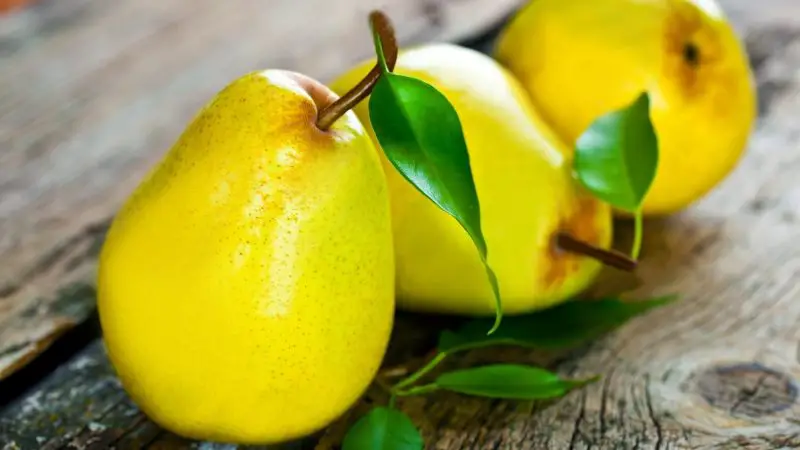
Pears are good for guinea pigs. Some of its health benefits are the following:
- Healthy cardiovascular system – The heart and all organs of the cardiovascular system will work perfectly. The low amount of fat will not clog the blood vessels, and the phytosterols will lower cholesterol and prevent heart diseases too.
- Prevention of scurvy – The vitamin C in the pear is a great nutrient for the guinea pig, and it will help with the scurvy prevention. This disease is fatal for the poor cavies, and it starts with rough fur, loss of appetite, diarrhea, bleedings and discharges too. So, receiving this vitamin from foods is beneficial for the guinea pig.
- Healthy blood – The copper in the pear will help make the blood healthier. It will create red blood cells, which means better iron absorption and anemia prevention in the long run.
Nutrition Facts of Pears for Guinea Pigs
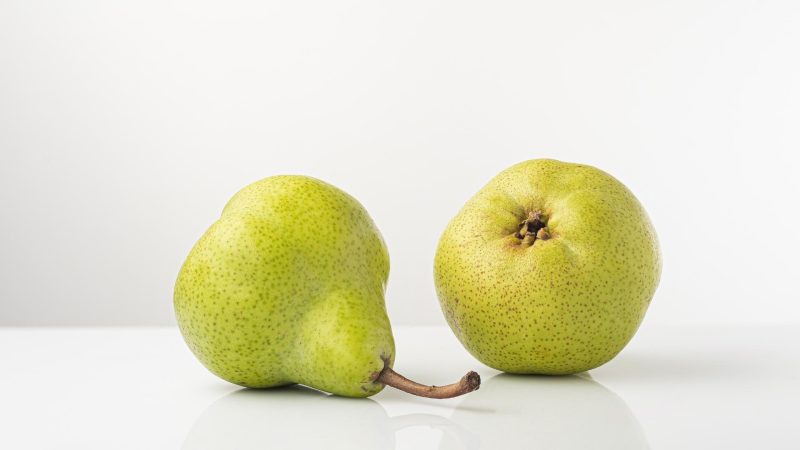
The nutritional information for 100 g (3 oz) of pear:
- Moderate in calories – 58 calories. This amount is normal for such a sweet fruit.
- Carbs and protein – In pear, there are 15.5 g of carbs and 0.4 g of protein.
- Fiber – 3.1 g. The pears can be good for digestion because they have a normal amount of fibers, which are important for good digestion and bowel movements. Excess fibers will cause diarrhea.
- High in sugar – 9.8 g. The pear is very sugary. This is not good for the guinea pig. Such amount of sugar will put the cavy at risk of obesity, and will surely cause tummy aches.
- Low in fat – 0.1 g. A low amount of fat is good news because the cardiovascular system will stay healthy.
- Vitamin C – 7%. Guinea pigs need this vitamin to survive and fight off the scurvy disease, so it’s good that pear has this vitamin.
- Vitamin E – 1%. This vitamin keeps the skin tissues in perfect health, lowers inflammation and prevents cancer and eyesight problems too. It also boosts immunity and heart health.
- Vitamin K – 6%. This vitamin is crucial for making the protein called prothrombin.
- Riboflavin – 1%. The riboflavin breaks down the foods into energy. Also, it promotes good flow of oxygen throughout the whole body.
- Calcium – 9 mg. A mineral essential for the formation of strong bone tissues, but harmful for fully grown guinea pigs. It can cause many urinary problems if it’s found in excess in their body.
- Magnesium – 2%. The magnesium mineral removes aches from muscles and keeps the muscles strong, as well as the heart muscle. Also, it can prevent diabetes, anxiety, and migraines.
- Potassium – 3%. The potassium normalizes the blood pressure and balances the water ratio in the body. The deficit of potassium results in fatigue and constipation.
- Copper – 4%. Copper is crucial for the creation of red blood cells. Also, it keeps nerves healthy, boosts the immunity, and produces collagen for healthy skin.
- Phytosterols – 8 mg. These compounds can lower cholesterol and prevent heart diseases, as well as inflammations.
Is Peals Poisonous to Guinea Pigs? | Possible Risks
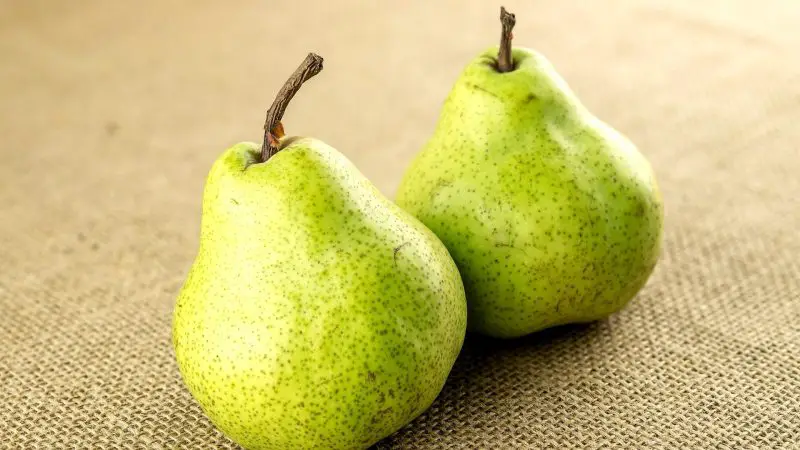
- Urinary complications – The calcium in the pear is a serious health risk for the guinea pig if you feed the cavy too much of this fruit of course. Excess of calcium in the guinea pig’s body will result in bladder and kidney stones.
Also, your guinea pig is at risk for painful urination, infections in the urinary tract and even blood in the urine. You must see a vet for this and treat it urgently if it occurs before the fatal renal failure happens.
- Digestion problems – Pears are very high in sugar, and this is not good at all for the gentle stomach of the guinea pig. Sugary foods cause stomach pains and bad digestion for the guinea pig, which results in diarrhea and cramps too.
- Risk of obesity – This fruit can cause rapid weight changes for the guinea pig. It is high in sugars and carbs too. These two nutrients are the main weight changers. So, feed the guinea pig pears in moderation to avoid weight gain.
Serving Size and Frequency of Pears for Guinea Pigs
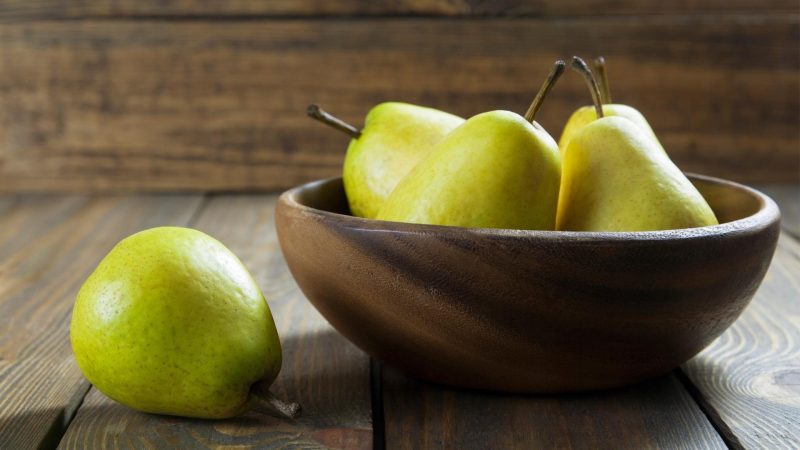
Can Guinea Pigs Eat Pears Everyday?
Guinea pigs cannot eat pears every day. The stomach of the little guinea pig is not designed to digest a lot of sugars. Excess sugars can cause painful digestion, not just weight gain. As with pears, it’s fine to do it twice a week, but no more.
How Much Pears Can Guinea Pigs Eat?
A few thin slices or chunks are good as serving. Chop the pear in thin pieces so that it’s easier for the guinea pigs to chew them. Just make sure to wash the pear well to rinse off any pesticides or dirt.
More Information About Guinea Pigs and Pears
Can Guinea Pigs Eat Frozen Pears?
Frozen pears are safe for guinea pigs to eat. However, it should be avoided at all costs. The enzymes in fruits and other foods are frequently broken when they are frozen.
Thus, they lose important vitamins. It’s preferable to offer them fresh fruits because they contain more nutrients and hence provide more advantages to the guinea pigs.
Can We Serve Pears Juice to Our Guinea Pigs?
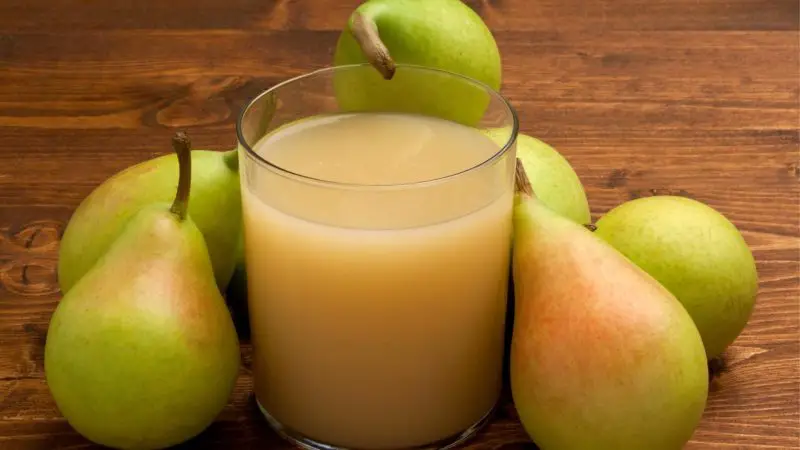
Fruit juices must never be given to our guinea pigs. The pears juice would be high in sugar, which is bad for your guinea pig’s health. Serve them with fresh fruits and vegetables. Those are the most effective ways for you to assist in supplementing their nutrition.
Can Guinea Pigs Eat Canned Pears?
They are quite useful for us humans since we can preserve them for a long time and they are typically cheaper than new pairs. For our guinea pigs, however, this is not an option.
Fruit juices are generally included in canned fruit, which we should avoid giving to guinea pigs.
These fruit juices often include a large level of sugars, which is bad for a guinea pig’s health. In addition, compared to fresh fruit, canned pears, and other canned fruits have much fewer nutrients.
Can Guinea Pigs Eat Pear Seeds?
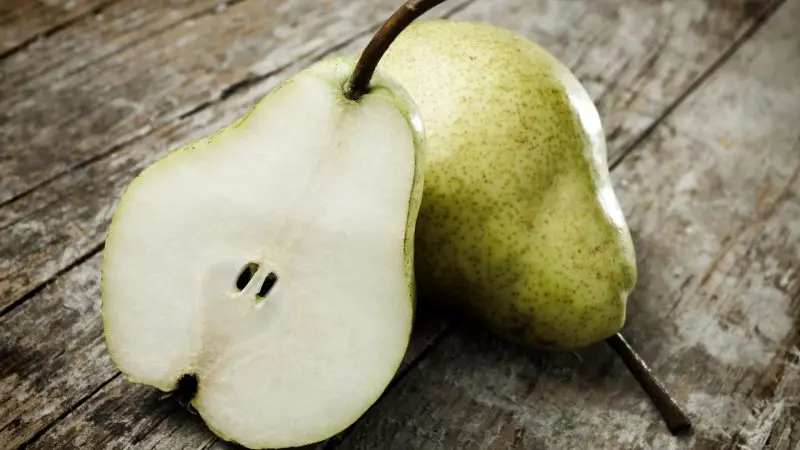
Guinea pigs cannot eat pear seeds. Pear seeds are small and pointy, and they can stuck in your guinea pig’s throat. It also contains tiny amounts of cyanide. This can affect the liver of guinea pigs.
Quick Facts on Pears
These are some of the interesting facts about pears which you will enjoy:
- There are over 3000 pear varieties worldwide.
- This fruit is originating from Europe and Asia. However, the first pears were planted on North America, in 1620.
- In China, people believed pear is symbolizing immortality. If a pear tree was destroyed, it meant tragedy or death.
- The pear leaves were smoked before tobacco was first used.
- In Greek mythology, the pear was a sacred fruit for the goddesses Aphrodite and Hera. It symbolized fruitfulness.
- In ancient Greece, the pear was used to treat nausea.
- Pears were also called ‘butter fruit’ because their texture is soft and buttery.
- The pears belong in the rose family group.
- The pear tree was used for making furniture, musical instruments and even wooden decorations.
We have also made a full list of foods that guinea pigs can and can’t eat (150+ Types of Foods). Be sure to also check our recommended products page for everything you will ever need to assure a happy life for your guinea pigs. Hope this information was helpful and you have found the answer you were looking for.
List of Sources
The Nutritional Story of Pears
Vitamin C Requirements of the Guinea-Pig
Dietary Requirements of the Guinea Pig With Reference to the Need for a Special Factor
